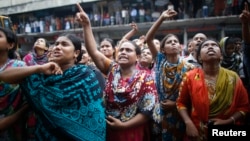More than 100 garment factories in Bangladesh have been forced to close as workers protest for a third day demanding a sharp raise in their minimum wage.
Police firing tear gas and rubber bullets clashed with rock-throwing protesters Monday in the Gazipur and Savar industrial areas outside the capital, Dhaka. Dozens of people were injured.
The workers are demanding they be paid $100 per month, up from the $38 a month they earn now.
Factory owners have offered to raise the minimum wage, but say they can only go as high as $45.
Working conditions in Bangladeshi garment factories have been in focus this year following a number of accidents, including a building collapse in April that killed more than 1,100 people.
Bangladesh is the world's second-largest apparel maker, earning $20 billion a year from the industry. But its economy is heavily dependent on the sector, which makes up 80 percent of the country's annual exports.
Police firing tear gas and rubber bullets clashed with rock-throwing protesters Monday in the Gazipur and Savar industrial areas outside the capital, Dhaka. Dozens of people were injured.
The workers are demanding they be paid $100 per month, up from the $38 a month they earn now.
Factory owners have offered to raise the minimum wage, but say they can only go as high as $45.
Working conditions in Bangladeshi garment factories have been in focus this year following a number of accidents, including a building collapse in April that killed more than 1,100 people.
Bangladesh is the world's second-largest apparel maker, earning $20 billion a year from the industry. But its economy is heavily dependent on the sector, which makes up 80 percent of the country's annual exports.





